(soft music) – [Instructor] Hey Psych2goers, and welcome back to another video. Before we start, we would
like to give you a big thanks for all the support that you’ve given us. Psych2gos mission is to make
psychology and mental health more accessible to everyone. Now let’s begin. Are you extremely afraid
of being judged by others? Are you very self-conscious
in everyday social situations? Do you avoid meeting new people? These are all trademark
signs of social anxiety, which affects approximately
15 million people in the United States alone. Social anxiety disorder is classified as a significant amount
of fear, embarrassment, or humiliation in social or
performance-based situations. It goes far deeper than mere shyness, where shyness is more
of a personality trait, Social anxiety disorder can
cause significant disruption of your daily life. Before we begin, we would like to mention that this video is created
for educational purposes only, and is not intended to substitute
a professional diagnosis. If you suspect you may have
social anxiety disorder or any mental health condition, we highly advise you to seek help from a qualified mental
health professional. With that said, here are nine things that social anxiety makes us do. One, repeatedly double-checking the location and time. Do you find yourself
repeatedly checking your phone to make sure you’re in the right place? It can be terrifying for
those with social anxiety to arrive late or walk
into the wrong room, so double or even triple-checking information is a must. Even if you know you’ve
got the details right, it can bring you peace of
mind just to make sure, it may be the difference between
walking in with confidence or hesitation. Two, rehearsing conversations
in your head ahead of time. While this may be a
subconscious practice at first, many people who face social
anxiety rehearse things they’re going to say before they have the actual conversation. This often begins as
imagining future conversations or running through a list of
important points to discuss. Some people find it more helpful to physically practice having
a conversation as well. That being said, not
everyone who rehearses their conversations beforehand, necessarily has social anxiety. Memorization and practice
are both common tools to aid you in feeling nervous, whether you’re anxious
about public speaking, talking to a specific person, or being social in general. Number three, avoiding phone calls. Even though it’s become a bit of a joke among millennials and Gen
For those who prefer to text, avoiding phone calls is
a fairly common behavior for people with social anxiety. Psychologist, Lindsay
Sharfstein told Headspace, that anxiety is typical for all of us, it’s a universal emotion
that we can all relate to. For the most part, we
know that individuals are not afraid of phones, they have phones in their
office, backpack, and purse, what they’re typically afraid of is the evaluation or
judgment that may happen when they’re on a phone. This may be why some
people prefer to text, instead of talk on the phone. The more one can put between themselves and the other person, the more comfortable they generally feel interacting. Four, faking phone calls. Have you ever pretended to
be in the middle of a call just to avoid talking to someone, or worn headphones to discourage others from approaching you? Although it’s safe to
assume that phone calls are not something that
people with social anxiety look forward to, faking
a call can come in handy. It can be a lot easier to act busy rather than face the awkwardness of an unwanted conversation, so this can become a habit of avoidance if you have social anxiety. Five, constantly worrying
about how everyone sees you. According to the Anxiety
and Depression Association of America, those with a
social anxiety disorder are increasingly concerned about how they are perceived by others.

The last thing they want
is to come off as awkward, fumbling, or boring. You’ve likely felt this way at some point throughout your life, whether it’s the desire
to fit in with friends or make a good impression
on a potential employer, with social anxiety however, this pressure to perform
feels constantly heavy and can lead to full-blown panic attacks when in social or
performance-based situations. Number six is feeling lonely, even when you’re surrounded by people. People with social anxiety
can share this feeling with those who battle depression and other mental illnesses as well. So, unfortunately, a lot
of people can relate to this isolating feeling. When social anxiety keeps you
from being your true self, it can be difficult to
feel included at all. It’s frustrating to be close to others, but not be able to connect
with them comfortably. If you’re struggling
to properly communicate and are extremely hesitant
to even start a conversation, that adds to your feelings of loneliness, even when you’re surrounded by others. Number seven, clenching your teeth and other physical discomforts. You feel shaky or lightheaded when faced with a social situation. Does your heart rate speed
up, or do your hands tremble? The stress that comes with social anxiety can manifest through physical symptoms. Many of the symptoms are
signs of nervousness, such as sweating, flushing,
and feeling shaky. According to the Mayo Clinic, you might also be dealing
with muscle tension, feeling that your mind has gone blank, or having trouble catching your breath. Number eight, obsessing over how you look. When you’re constantly worried about how others perceive you, you’re likely to be concerned
with how you look as well. You might have a distorted body image and think that you’re less
physically attractive. Your thoughts can flit from
your hair to your clothes or flaws in your skin, thinking
that it’s just all wrong. In an attempt to feel
comfortable in your skin, you might spend an inappropriate
amount of time and money on fixing your appearance, such as shopping for better clothes, getting high-end beauty
products, or going on diets if you think you’re overweight. And number nine, you
feel more like yourself around the people you’re comfortable with. You think you’re picky about
who you spend time with and triumph over shyness, conquering social anxiety disorder, Dr. Marie B. Stein and John R. Walker discuss behavior in children
called selective mutism. This is when a child
speaks and acts normally around select individuals,
but is completely silent around everyone else, or when
placed in certain situations, this is a more extreme example, but it shows how those with social anxiety are more likely to relax and open up around people they already know and trust. Do you or anyone you know resonate with any of these points
mentioned in this video? If you’re concerned about
social anxiety disorder, we encourage you to speak with
a mental health professional, they can help you overcome any fears or debilitating problems you might have. If you enjoyed watching this
video, give us a thumbs up and share it with someone who
might find it helpful as well. The studies and references
used in this video are listed in the description below. Don’t forget to hit the subscribe button for more Psych2go videos and as always, thanks for watching, and we’ll see you next time.
As found on YouTubeAFFILIATE MASTERY BONUS: 6-Week LIVE Series Has Begun!
FunnelMates $46.⁹⁵ Replays are Instantly Available. Want A Profitable Mailing List But Not Sure Where To Begin? We’ll Guide You, Equip You, and even PAY You Cash To Do It!

☃in 5-10 Minutes A Day Using Automation Software and our Time-Tested Strategy See How Your New Site Can Be Live In Just 27 Seconds From Now!
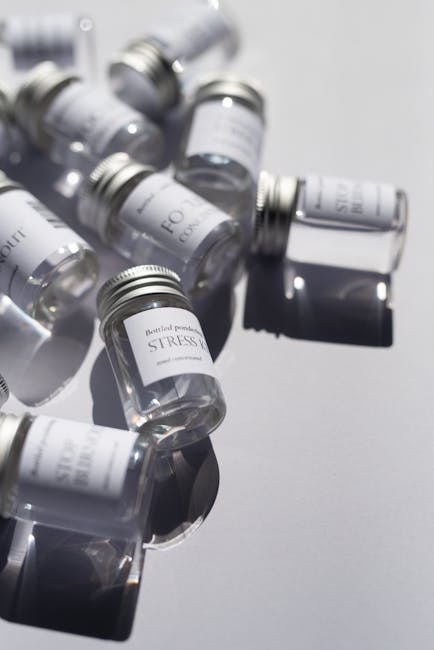 It can be a lot easier to act busy rather than face the awkwardness of an unwanted conversation. So, this can become a habit of avoidance. If you have social anxiety, five constantly worrying about how everyone sees you. According to the Anxiety and Depression Association of America, those with a social anxiety disorder are increasingly concerned about how they are perceived by others. The last thing they want is to come off as awkward, fumbling, or boring. You’ve likely felt this way at some point throughout your life, whether it’s the desire to fit in with friends or make a good impression on a potential employer with social anxiety. However, this pressure to perform feels constantly heavy and can lead to full-blown panic attacks when in social or performance-based situations Number six is feeling lonely. Even when you’re surrounded by people, People with social anxiety can share this feeling with those who battle, depression and other mental illnesses as well. So, unfortunately, a lot of people can relate to this isolating feeling When social anxiety keeps you from being your true self. It can be difficult to feel included at all. It’s frustrating to be close to others, but not be able to connect with them in a comfortable way. If you’re struggling to effectively communicate and are extremely hesitant to even start a conversation that adds to your feelings of loneliness, even when you’re, surrounded by others, Number seven clenching your teeth and other physical discomforts, you feel shaky or lightheaded when faced with A social situation: Does your heart rate speed up or do your hands tremble? The stress that comes with social anxiety can manifest through physical symptoms. Many of the symptoms are signs of nervousness such as sweating, flushing, and feeling shaky According to Mayo Clinic. You might also be dealing with muscle tension, feeling that your mind has gone blank, or having trouble catching your breath. Number eight obsessing over how you look When you’re, constantly worried about how others perceive you. You’re likely to be concerned with how you look as well. You might have a distorted body image and think that you’re less physically attractive. Your thoughts can flit from your hair to your clothes or flaws in your skin. Thinking that it’s just all wrong In an attempt to feel comfortable in your own skin, you might spend an inappropriate amount of time and money on fixing your appearance, such as shopping for better clothes, getting high-end beauty products, or going on diets. If you think you’re overweight and number nine, you feel more like yourself around the people. You’re comfortable with Yourself, think you’re picky about who you spend time with, and triumph over shyness by conquering social anxiety disorder, Dr. Marie B. Stein and John R. Walker discusses behavior in children called selective mutism. This is when a child speaks and acts normally around select individuals but is completely silent around everyone else or when placed in certain situations. This is a more extreme example, but it shows how those with social anxiety are more likely to relax and open up around people. They already know and trust, do you or anyone you know resonate with any of these points mentioned in this video? If you’re concerned about social anxiety disorder, we encourage you to speak with a mental health professional. They can help you overcome any fears or debilitating problems you might have If you enjoyed watching this video, give us a thumbs up and share it with someone who might find it helpful as well. The studies and references used in this video are listed in the description below Don’t forget to hit the subscribe button for more Psych2go videos and as always thanks for watching and we’ll see you next time.As found on YouTubeNatural Synergy $47.⁰⁰ New Non-Invasive Alternative. To Electro-Acupuncture, Producing Astounding Results… Self-Application Is Easy, Rapid Response. You’re about to discover how both chronic and acute pain, skin conditions, migraines, and hundreds of ailments all stem from the same root cause ꆛ Yin Yang Ailments🗯 such as➯➱ ➫ ➪➬ Chronic pain⇝Low immunity⇝Chronic acid reflux⇝High blood pressure⇝Addictions⇝Fibromyalgia⇝Allergies⇝Osteoarthritis⇝Headaches⇝Low back⇝pain Asthma⇝Headaches⇝Depression and anxiety⇝Urinary problems… to name just a few…
It can be a lot easier to act busy rather than face the awkwardness of an unwanted conversation. So, this can become a habit of avoidance. If you have social anxiety, five constantly worrying about how everyone sees you. According to the Anxiety and Depression Association of America, those with a social anxiety disorder are increasingly concerned about how they are perceived by others. The last thing they want is to come off as awkward, fumbling, or boring. You’ve likely felt this way at some point throughout your life, whether it’s the desire to fit in with friends or make a good impression on a potential employer with social anxiety. However, this pressure to perform feels constantly heavy and can lead to full-blown panic attacks when in social or performance-based situations Number six is feeling lonely. Even when you’re surrounded by people, People with social anxiety can share this feeling with those who battle, depression and other mental illnesses as well. So, unfortunately, a lot of people can relate to this isolating feeling When social anxiety keeps you from being your true self. It can be difficult to feel included at all. It’s frustrating to be close to others, but not be able to connect with them in a comfortable way. If you’re struggling to effectively communicate and are extremely hesitant to even start a conversation that adds to your feelings of loneliness, even when you’re, surrounded by others, Number seven clenching your teeth and other physical discomforts, you feel shaky or lightheaded when faced with A social situation: Does your heart rate speed up or do your hands tremble? The stress that comes with social anxiety can manifest through physical symptoms. Many of the symptoms are signs of nervousness such as sweating, flushing, and feeling shaky According to Mayo Clinic. You might also be dealing with muscle tension, feeling that your mind has gone blank, or having trouble catching your breath. Number eight obsessing over how you look When you’re, constantly worried about how others perceive you. You’re likely to be concerned with how you look as well. You might have a distorted body image and think that you’re less physically attractive. Your thoughts can flit from your hair to your clothes or flaws in your skin. Thinking that it’s just all wrong In an attempt to feel comfortable in your own skin, you might spend an inappropriate amount of time and money on fixing your appearance, such as shopping for better clothes, getting high-end beauty products, or going on diets. If you think you’re overweight and number nine, you feel more like yourself around the people. You’re comfortable with Yourself, think you’re picky about who you spend time with, and triumph over shyness by conquering social anxiety disorder, Dr. Marie B. Stein and John R. Walker discusses behavior in children called selective mutism. This is when a child speaks and acts normally around select individuals but is completely silent around everyone else or when placed in certain situations. This is a more extreme example, but it shows how those with social anxiety are more likely to relax and open up around people. They already know and trust, do you or anyone you know resonate with any of these points mentioned in this video? If you’re concerned about social anxiety disorder, we encourage you to speak with a mental health professional. They can help you overcome any fears or debilitating problems you might have If you enjoyed watching this video, give us a thumbs up and share it with someone who might find it helpful as well. The studies and references used in this video are listed in the description below Don’t forget to hit the subscribe button for more Psych2go videos and as always thanks for watching and we’ll see you next time.As found on YouTubeNatural Synergy $47.⁰⁰ New Non-Invasive Alternative. To Electro-Acupuncture, Producing Astounding Results… Self-Application Is Easy, Rapid Response. You’re about to discover how both chronic and acute pain, skin conditions, migraines, and hundreds of ailments all stem from the same root cause ꆛ Yin Yang Ailments🗯 such as➯➱ ➫ ➪➬ Chronic pain⇝Low immunity⇝Chronic acid reflux⇝High blood pressure⇝Addictions⇝Fibromyalgia⇝Allergies⇝Osteoarthritis⇝Headaches⇝Low back⇝pain Asthma⇝Headaches⇝Depression and anxiety⇝Urinary problems… to name just a few…
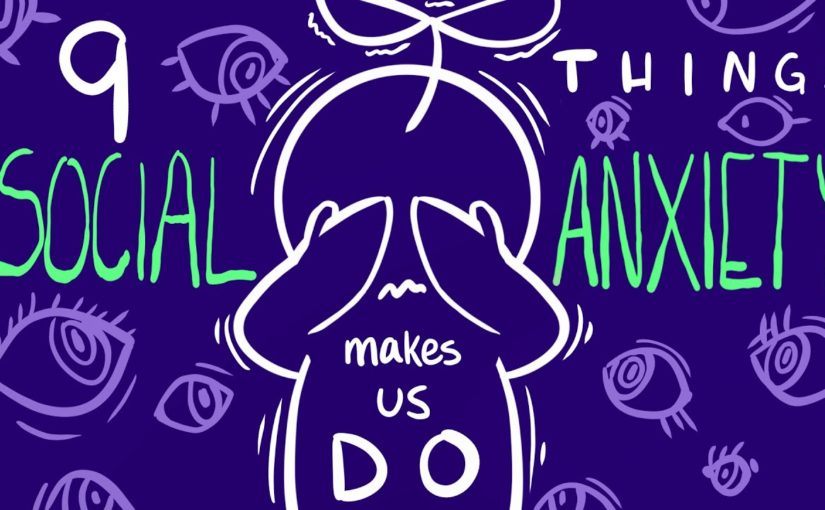
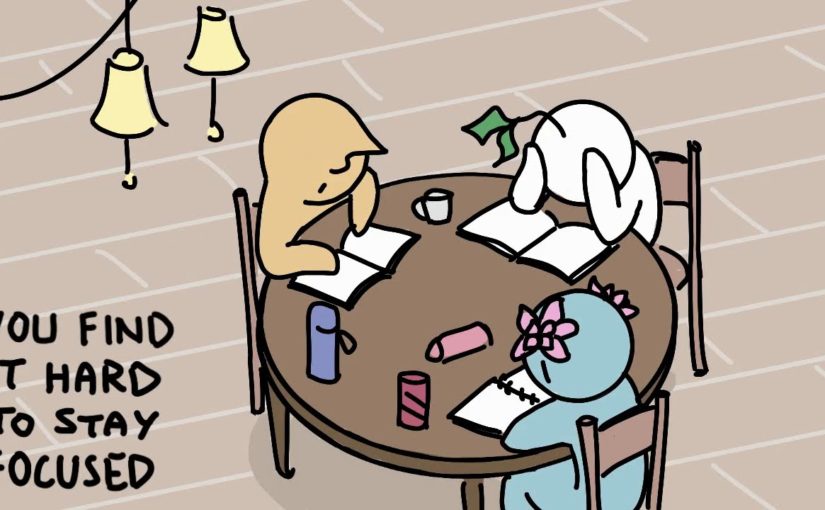
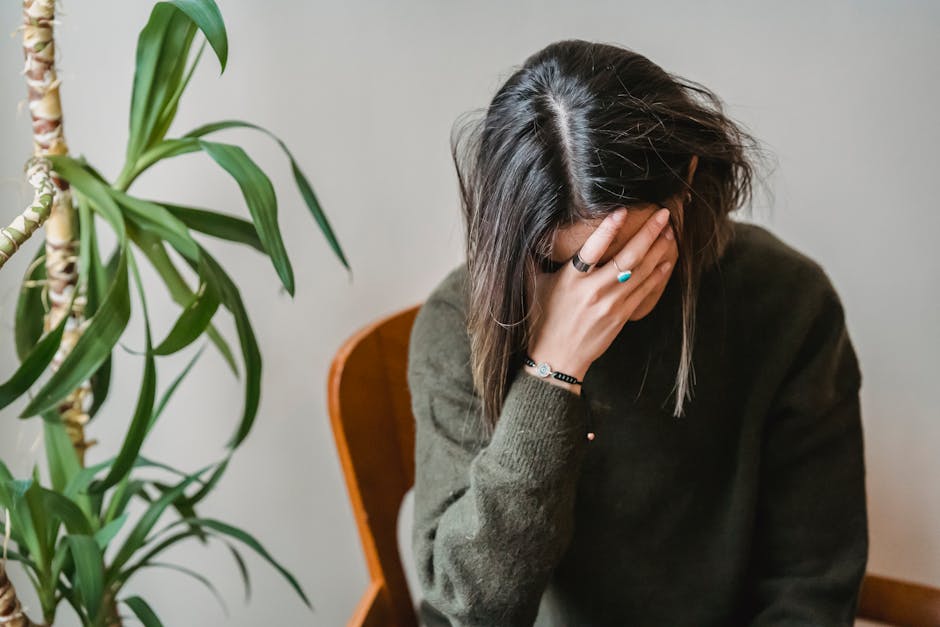 Is one more likely than
the other to take place? Number four, you have no clue if others can sense your anxiety. Do you worry about whether
Or can no other people tell when you’re feeling anxious? And then are you doubly
worried about how someone will react if they do find out
you’re having a panic attack? Since no people experience
anxiety the same way nor are any two situations the same, there’s no tangible way to tell
unless you tell someone that you’re not feeling well. If anything, your anxiety
is not as noticeable as you fear it to be. There are so many other restless, sweaty, awkward people in the world and everyone else is probably
too worried about themselves that they’re less likely to notice if you look a little
flushed or acted a little odd. Five, you can literally
worry yourself sick. Have you ever been so stressed
and worried that you felt like you might throw up or pass out? When you suffer from anxiety,
These severe reactions become normal which can put immense stress on your body over time. Mayo Clinic states that
symptoms such as headaches, heart palpitations, and
Gastrointestinal issues are common expressions of anxiety. Dealing with these over
an extended period of time can lead to complications such
as irritable bowel syndrome and other chronic disruptions
in the nervous system. Six, self-doubt slows you down socially. Do you long to be out and
about with your friends but your anxiety and doubt convince you to stay home instead? Socializing can be incredibly stressful for someone with anxiety, especially if you have
social anxiety disorder which is specific to
public or group settings. Between physical symptoms
and a racing mind, keeping up a conversation with
your friends can be tricky. Your brain interrupts with
intrusive thoughts and questions and you wonder if you’re doing it right. If you notice that you’re worrying about whether your anxiety makes
you come across as awkward or quiet, that’s okay. It’s good to be aware
of your effect on others but make sure you’re trying your best to be genuine and be you. Living in today’s society is
a lot of pressure already, so there’s no need to
double down on yourself. Seven, you find it hard to stay focused, you find
It is hard to stay focused. When your anxiety is bad, do
you struggle to concentrate? Like, when you must
reread a page in a book a couple of times over before you finally comprehend what you’re reading. Recent BBC research cites a 2011 study from the University of Notre Dame, which confirms that the
brain is designed to hold only so much information at once. If you’re taking up that
space with tons of what-ifs and worries, there won’t be much room left for anything else. Changing your thought patterns
won’t happen overnight but it’s certainly possible. It will likely take some trial and error to find what works for you
but practicing mindfulness, getting exercise, and avoiding multitasking are a few good places to start. And number eight, yes, you can have anxiety
about your anxiety. Have you ever heard of agoraphobia? The UK National Health
Service defines agoraphobia as a fear of being in
situations where escape might be difficult or that
help wouldn’t be available if things go wrong. Most people who suffer from this condition practice avoidance. Some might refuse to take
public transportation or be in crowded or open spaces, while others may not
leave their house at all. Avoidance aims to protect you from danger, panic, and even embarrassment. Did you relate to any of these scenarios? Tell us about it in the comments below. Anxiety is tough but so are you. If you have any other tips that
help you with your anxiety, share them in the comments below. If you found this video
helpful, please like and share this video with someone who can benefit from it too. The studies and references used are listed in the description below. Don’t forget to hit the subscribe button and the notification bell icon
for more psych2 go videos. Thank you for watching and
We’ll see you next time.
Is one more likely than
the other to take place? Number four, you have no clue if others can sense your anxiety. Do you worry about whether
Or can no other people tell when you’re feeling anxious? And then are you doubly
worried about how someone will react if they do find out
you’re having a panic attack? Since no people experience
anxiety the same way nor are any two situations the same, there’s no tangible way to tell
unless you tell someone that you’re not feeling well. If anything, your anxiety
is not as noticeable as you fear it to be. There are so many other restless, sweaty, awkward people in the world and everyone else is probably
too worried about themselves that they’re less likely to notice if you look a little
flushed or acted a little odd. Five, you can literally
worry yourself sick. Have you ever been so stressed
and worried that you felt like you might throw up or pass out? When you suffer from anxiety,
These severe reactions become normal which can put immense stress on your body over time. Mayo Clinic states that
symptoms such as headaches, heart palpitations, and
Gastrointestinal issues are common expressions of anxiety. Dealing with these over
an extended period of time can lead to complications such
as irritable bowel syndrome and other chronic disruptions
in the nervous system. Six, self-doubt slows you down socially. Do you long to be out and
about with your friends but your anxiety and doubt convince you to stay home instead? Socializing can be incredibly stressful for someone with anxiety, especially if you have
social anxiety disorder which is specific to
public or group settings. Between physical symptoms
and a racing mind, keeping up a conversation with
your friends can be tricky. Your brain interrupts with
intrusive thoughts and questions and you wonder if you’re doing it right. If you notice that you’re worrying about whether your anxiety makes
you come across as awkward or quiet, that’s okay. It’s good to be aware
of your effect on others but make sure you’re trying your best to be genuine and be you. Living in today’s society is
a lot of pressure already, so there’s no need to
double down on yourself. Seven, you find it hard to stay focused, you find
It is hard to stay focused. When your anxiety is bad, do
you struggle to concentrate? Like, when you must
reread a page in a book a couple of times over before you finally comprehend what you’re reading. Recent BBC research cites a 2011 study from the University of Notre Dame, which confirms that the
brain is designed to hold only so much information at once. If you’re taking up that
space with tons of what-ifs and worries, there won’t be much room left for anything else. Changing your thought patterns
won’t happen overnight but it’s certainly possible. It will likely take some trial and error to find what works for you
but practicing mindfulness, getting exercise, and avoiding multitasking are a few good places to start. And number eight, yes, you can have anxiety
about your anxiety. Have you ever heard of agoraphobia? The UK National Health
Service defines agoraphobia as a fear of being in
situations where escape might be difficult or that
help wouldn’t be available if things go wrong. Most people who suffer from this condition practice avoidance. Some might refuse to take
public transportation or be in crowded or open spaces, while others may not
leave their house at all. Avoidance aims to protect you from danger, panic, and even embarrassment. Did you relate to any of these scenarios? Tell us about it in the comments below. Anxiety is tough but so are you. If you have any other tips that
help you with your anxiety, share them in the comments below. If you found this video
helpful, please like and share this video with someone who can benefit from it too. The studies and references used are listed in the description below. Don’t forget to hit the subscribe button and the notification bell icon
for more psych2 go videos. Thank you for watching and
We’ll see you next time.
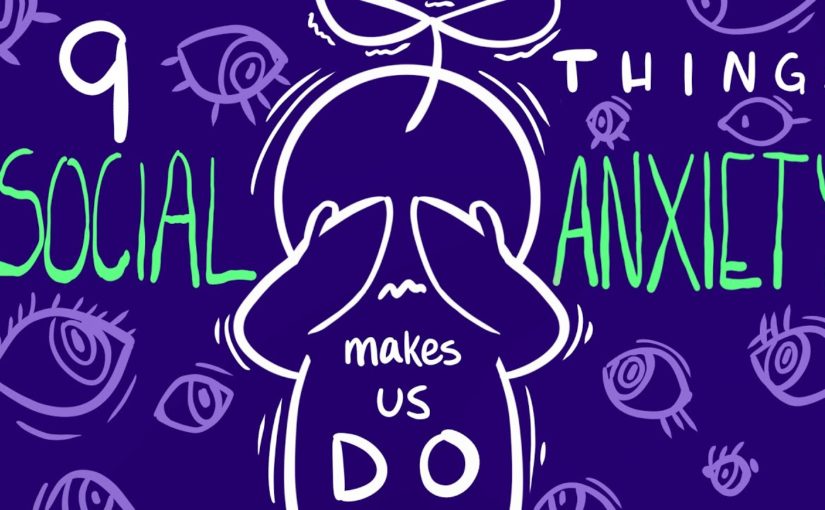
 The last thing they want
is to come off as awkward, fumbling, or boring. You’ve likely felt this way at some point throughout your life, whether it’s the desire
to fit in with friends or make a good impression
on a potential employer, with social anxiety however, this pressure to perform
feels constantly heavy and can lead to full-blown panic attacks when in social or
performance-based situations. Number six is feeling lonely, even when you’re surrounded by people. People with social anxiety
can share this feeling with those who battle depression and other mental illnesses as well. So, unfortunately, a lot
of people can relate to this isolating feeling. When social anxiety keeps you
from being your true self, it can be difficult to
feel included at all. It’s frustrating to be close to others, but not be able to connect
with them comfortably. If you’re struggling
to properly communicate and are extremely hesitant
to even start a conversation, that adds to your feelings of loneliness, even when you’re surrounded by others. Number seven, clenching your teeth and other physical discomforts. You feel shaky or lightheaded when faced with a social situation. Does your heart rate speed
up, or do your hands tremble? The stress that comes with social anxiety can manifest through physical symptoms. Many of the symptoms are
signs of nervousness, such as sweating, flushing,
and feeling shaky. According to the Mayo Clinic, you might also be dealing
with muscle tension, feeling that your mind has gone blank, or having trouble catching your breath. Number eight, obsessing over how you look. When you’re constantly worried about how others perceive you, you’re likely to be concerned
with how you look as well. You might have a distorted body image and think that you’re less
physically attractive. Your thoughts can flit from
your hair to your clothes or flaws in your skin, thinking
that it’s just all wrong. In an attempt to feel
comfortable in your skin, you might spend an inappropriate
amount of time and money on fixing your appearance, such as shopping for better clothes, getting high-end beauty
products, or going on diets if you think you’re overweight. And number nine, you
feel more like yourself around the people you’re comfortable with. You think you’re picky about
who you spend time with and triumph over shyness, conquering social anxiety disorder, Dr. Marie B. Stein and John R. Walker discuss behavior in children
called selective mutism. This is when a child
speaks and acts normally around select individuals,
but is completely silent around everyone else, or when
placed in certain situations, this is a more extreme example, but it shows how those with social anxiety are more likely to relax and open up around people they already know and trust. Do you or anyone you know resonate with any of these points
mentioned in this video? If you’re concerned about
social anxiety disorder, we encourage you to speak with
a mental health professional, they can help you overcome any fears or debilitating problems you might have. If you enjoyed watching this
video, give us a thumbs up and share it with someone who
might find it helpful as well. The studies and references
used in this video are listed in the description below. Don’t forget to hit the subscribe button for more Psych2go videos and as always, thanks for watching, and we’ll see you next time.
The last thing they want
is to come off as awkward, fumbling, or boring. You’ve likely felt this way at some point throughout your life, whether it’s the desire
to fit in with friends or make a good impression
on a potential employer, with social anxiety however, this pressure to perform
feels constantly heavy and can lead to full-blown panic attacks when in social or
performance-based situations. Number six is feeling lonely, even when you’re surrounded by people. People with social anxiety
can share this feeling with those who battle depression and other mental illnesses as well. So, unfortunately, a lot
of people can relate to this isolating feeling. When social anxiety keeps you
from being your true self, it can be difficult to
feel included at all. It’s frustrating to be close to others, but not be able to connect
with them comfortably. If you’re struggling
to properly communicate and are extremely hesitant
to even start a conversation, that adds to your feelings of loneliness, even when you’re surrounded by others. Number seven, clenching your teeth and other physical discomforts. You feel shaky or lightheaded when faced with a social situation. Does your heart rate speed
up, or do your hands tremble? The stress that comes with social anxiety can manifest through physical symptoms. Many of the symptoms are
signs of nervousness, such as sweating, flushing,
and feeling shaky. According to the Mayo Clinic, you might also be dealing
with muscle tension, feeling that your mind has gone blank, or having trouble catching your breath. Number eight, obsessing over how you look. When you’re constantly worried about how others perceive you, you’re likely to be concerned
with how you look as well. You might have a distorted body image and think that you’re less
physically attractive. Your thoughts can flit from
your hair to your clothes or flaws in your skin, thinking
that it’s just all wrong. In an attempt to feel
comfortable in your skin, you might spend an inappropriate
amount of time and money on fixing your appearance, such as shopping for better clothes, getting high-end beauty
products, or going on diets if you think you’re overweight. And number nine, you
feel more like yourself around the people you’re comfortable with. You think you’re picky about
who you spend time with and triumph over shyness, conquering social anxiety disorder, Dr. Marie B. Stein and John R. Walker discuss behavior in children
called selective mutism. This is when a child
speaks and acts normally around select individuals,
but is completely silent around everyone else, or when
placed in certain situations, this is a more extreme example, but it shows how those with social anxiety are more likely to relax and open up around people they already know and trust. Do you or anyone you know resonate with any of these points
mentioned in this video? If you’re concerned about
social anxiety disorder, we encourage you to speak with
a mental health professional, they can help you overcome any fears or debilitating problems you might have. If you enjoyed watching this
video, give us a thumbs up and share it with someone who
might find it helpful as well. The studies and references
used in this video are listed in the description below. Don’t forget to hit the subscribe button for more Psych2go videos and as always, thanks for watching, and we’ll see you next time.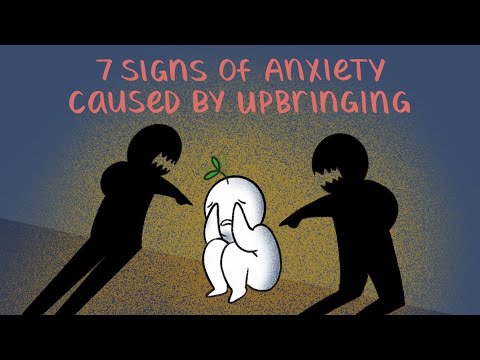
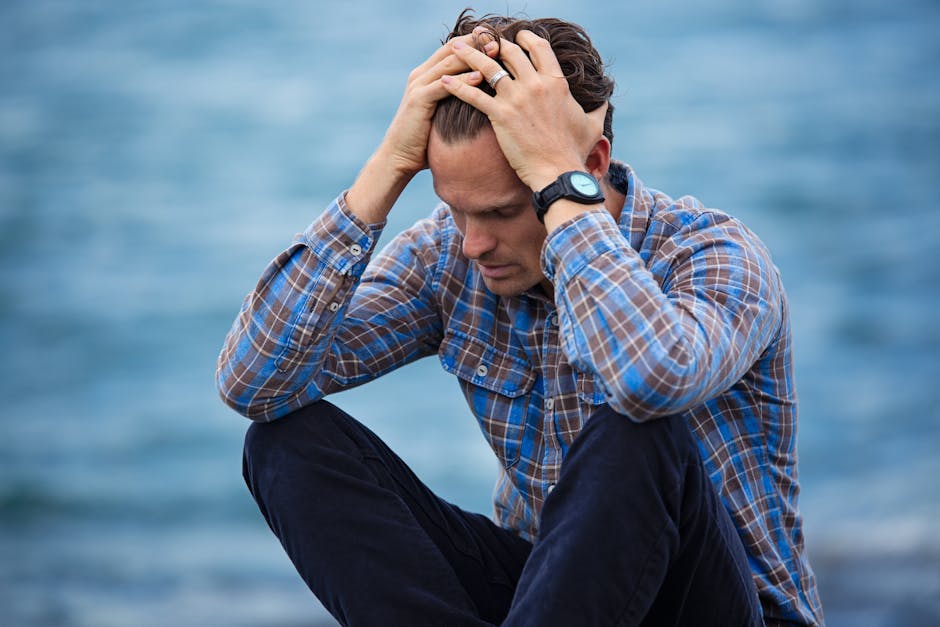 Conditioned by judgmental parents at an early age. You may struggle with worry and fear of what others think about you. Their emphasis is on the opinion of others instead of on social initiatives and family sociability. This may lead to social anxiety. #5 You are overly cautious. Did your parents tend to constantly check on you when you’re not around them? If you have overprotective parents,
there’s a chance that you may be overly cautious. This is because having overprotective parents may condition you at a young age to be wary of everything. It can lead to having a certain worry and fear of things that are unknown to you. Although it can be beneficial to be overly cautious at times. It can also lead to a lot of anxiety. #6 You fear relationships. Do you find yourself scared about forming relationships? This fear may have stemmed from growing up in a separated family. Since you may fear that your current relationships will end up with the same outcome. Having neglectful parents could also cause you to fear relationships… …because it could make you think that your partner will neglect you in the same way. And #7 You doubt yourself. Have you ever said to yourself… What if I’m doing it wrong? Or am I making a mistake? Your parents’ constant criticism of your ability…can result in you developing constant self-doubt as you grow up. This will also cause you to have a higher risk of developing anxiety disorders in childhood. Do you relate to any of these signs? Let us know in the comments below! If you find this video helpful… Be sure to like, subscribe, and share this video with those who might benefit from it. The references and studies used in this video are added in the description below. Thanks for reading and we’ll see you in the next video!
Conditioned by judgmental parents at an early age. You may struggle with worry and fear of what others think about you. Their emphasis is on the opinion of others instead of on social initiatives and family sociability. This may lead to social anxiety. #5 You are overly cautious. Did your parents tend to constantly check on you when you’re not around them? If you have overprotective parents,
there’s a chance that you may be overly cautious. This is because having overprotective parents may condition you at a young age to be wary of everything. It can lead to having a certain worry and fear of things that are unknown to you. Although it can be beneficial to be overly cautious at times. It can also lead to a lot of anxiety. #6 You fear relationships. Do you find yourself scared about forming relationships? This fear may have stemmed from growing up in a separated family. Since you may fear that your current relationships will end up with the same outcome. Having neglectful parents could also cause you to fear relationships… …because it could make you think that your partner will neglect you in the same way. And #7 You doubt yourself. Have you ever said to yourself… What if I’m doing it wrong? Or am I making a mistake? Your parents’ constant criticism of your ability…can result in you developing constant self-doubt as you grow up. This will also cause you to have a higher risk of developing anxiety disorders in childhood. Do you relate to any of these signs? Let us know in the comments below! If you find this video helpful… Be sure to like, subscribe, and share this video with those who might benefit from it. The references and studies used in this video are added in the description below. Thanks for reading and we’ll see you in the next video!
 They compared the mineral content
of nettle tea to chamomile tea, mint tea, St. John’s wort, and sage. Nettle tea didn’t seem to have
much more than any of the others— but, maybe they’re all high? Well, one cup of nettle tea
does have the iron of a dried apricot (that’s more than I expected), the zinc found in one pumpkin seed,
one-twentieth of a mushroom’s worth of copper— but four peanuts’ worth of magnesium,
and an entire fig’s worth of calcium. I agree with the researchers that,
you know, a cup of herbal tea may not be an important source
of minerals, but it’s not negligible. You know, greens are so packed
with nutrition that you can benefit from just drinking some hot water
they’ve been soaking in for a few minutes.
They compared the mineral content
of nettle tea to chamomile tea, mint tea, St. John’s wort, and sage. Nettle tea didn’t seem to have
much more than any of the others— but, maybe they’re all high? Well, one cup of nettle tea
does have the iron of a dried apricot (that’s more than I expected), the zinc found in one pumpkin seed,
one-twentieth of a mushroom’s worth of copper— but four peanuts’ worth of magnesium,
and an entire fig’s worth of calcium. I agree with the researchers that,
you know, a cup of herbal tea may not be an important source
of minerals, but it’s not negligible. You know, greens are so packed
with nutrition that you can benefit from just drinking some hot water
they’ve been soaking in for a few minutes.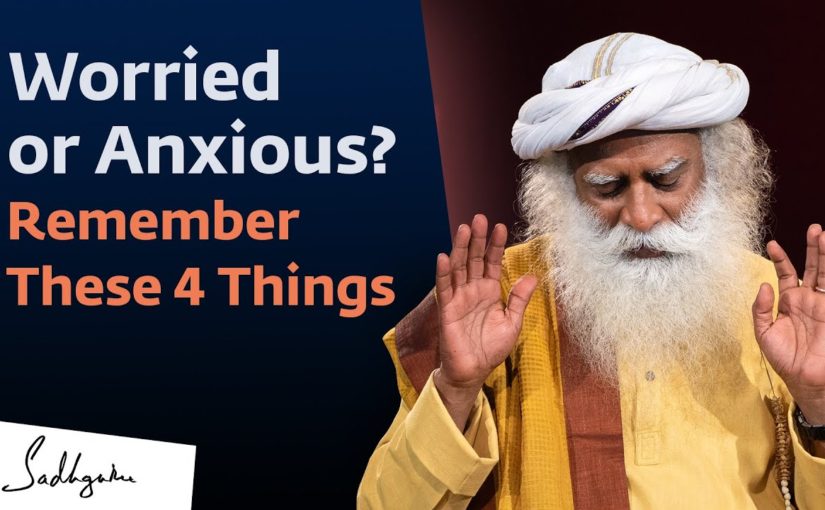
 It’s a brief amount of time that you have as life. In this, if you take yourself too seriously, you are one big joke. The secret of life is to see everything with a non-serious eye but to be involved like a sport. So be a sport for life. If you want to be a sport for life, you have to be able to see that your existence is of consequence for the times in which we live, but not of eternal consequence unless you touch the eternal dimension of who you are. It’s such a brief life, only by doing what you truly care for, will your life become worthwhile. If genuine involvement has to come in your life, for you to give yourself absolutely, you must be doing something that truly, truly matters to you. You must find that. When I say it’s important to find that, you don’t have to spend half your life looking for what is my passion. No. You just have to dig into this ability you making everything yours. When everything is yours, this whole world is yours, this cosmos is yours. So when it is a part of you, if you involve yourself absolutely, and constantly strive to create what matters to you, what you care for, then your existence itself will be worthwhile, not necessarily your actions, not what you achieve and may not achieve, but your very existence will be truly worthwhile because just to breathe and be is phenomena (Laughs). There are no greater phenomena than life. If this is not worthwhile, if this is not worthwhile, what is?
.
It’s a brief amount of time that you have as life. In this, if you take yourself too seriously, you are one big joke. The secret of life is to see everything with a non-serious eye but to be involved like a sport. So be a sport for life. If you want to be a sport for life, you have to be able to see that your existence is of consequence for the times in which we live, but not of eternal consequence unless you touch the eternal dimension of who you are. It’s such a brief life, only by doing what you truly care for, will your life become worthwhile. If genuine involvement has to come in your life, for you to give yourself absolutely, you must be doing something that truly, truly matters to you. You must find that. When I say it’s important to find that, you don’t have to spend half your life looking for what is my passion. No. You just have to dig into this ability you making everything yours. When everything is yours, this whole world is yours, this cosmos is yours. So when it is a part of you, if you involve yourself absolutely, and constantly strive to create what matters to you, what you care for, then your existence itself will be worthwhile, not necessarily your actions, not what you achieve and may not achieve, but your very existence will be truly worthwhile because just to breathe and be is phenomena (Laughs). There are no greater phenomena than life. If this is not worthwhile, if this is not worthwhile, what is?
.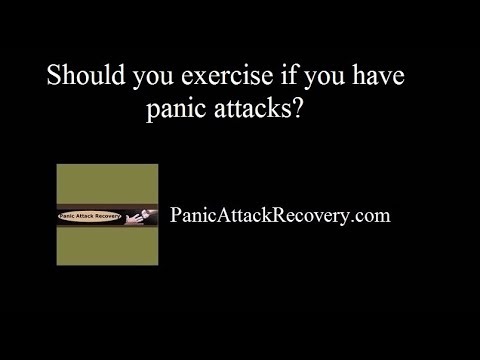
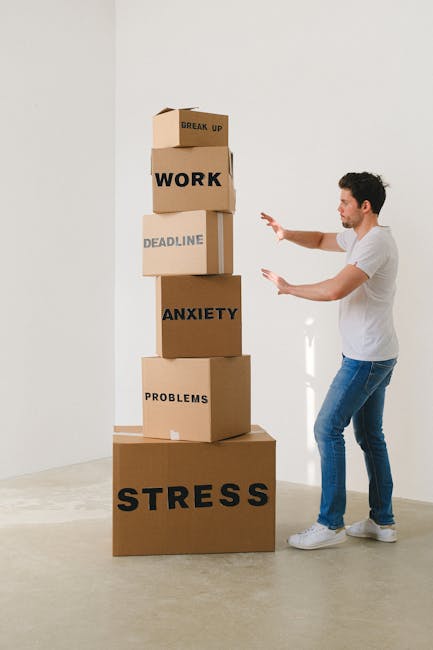 We think that realizing the connection between
exercise and panic attacks can be very helpful not only because of the reasons above. But the reason is that exercise allows you
to be in a controlled situation where are increasing your pulse. This demonstrates that you can deal with an
increased pulse – an increased pulse, as you are no doubt aware, is often one of the
concerns the sufferer has during a panic attack. I would like to mention a study completed
at Charite University Medicine in Berlin. This study found that 50% of subjects who
completed 30 minutes of daily aerobic exercise were able to avoid having a panic attack in
the experiment. Researchers wrote: “Our results for the
first time suggest that exercise has an acute anti panic activity.” Pretty good evidence for a correlation between
exercise and panic attacks. So what’s cool: The energy that one
might have invested in their anxiety, in the past, can be redirected to their well-being
through exercise. This realization in itself can make one feel
better. Be sure to
subscribe to our channel and like our videos if they are helpful to you. Please feel free to share our videos with
others who may benefit from them. Your communication is important to us. If you have any questions or comments, please
feel free to leave them in the in comments below. To get started with more help you can join
our free newsletter at:
We think that realizing the connection between
exercise and panic attacks can be very helpful not only because of the reasons above. But the reason is that exercise allows you
to be in a controlled situation where are increasing your pulse. This demonstrates that you can deal with an
increased pulse – an increased pulse, as you are no doubt aware, is often one of the
concerns the sufferer has during a panic attack. I would like to mention a study completed
at Charite University Medicine in Berlin. This study found that 50% of subjects who
completed 30 minutes of daily aerobic exercise were able to avoid having a panic attack in
the experiment. Researchers wrote: “Our results for the
first time suggest that exercise has an acute anti panic activity.” Pretty good evidence for a correlation between
exercise and panic attacks. So what’s cool: The energy that one
might have invested in their anxiety, in the past, can be redirected to their well-being
through exercise. This realization in itself can make one feel
better. Be sure to
subscribe to our channel and like our videos if they are helpful to you. Please feel free to share our videos with
others who may benefit from them. Your communication is important to us. If you have any questions or comments, please
feel free to leave them in the in comments below. To get started with more help you can join
our free newsletter at: 
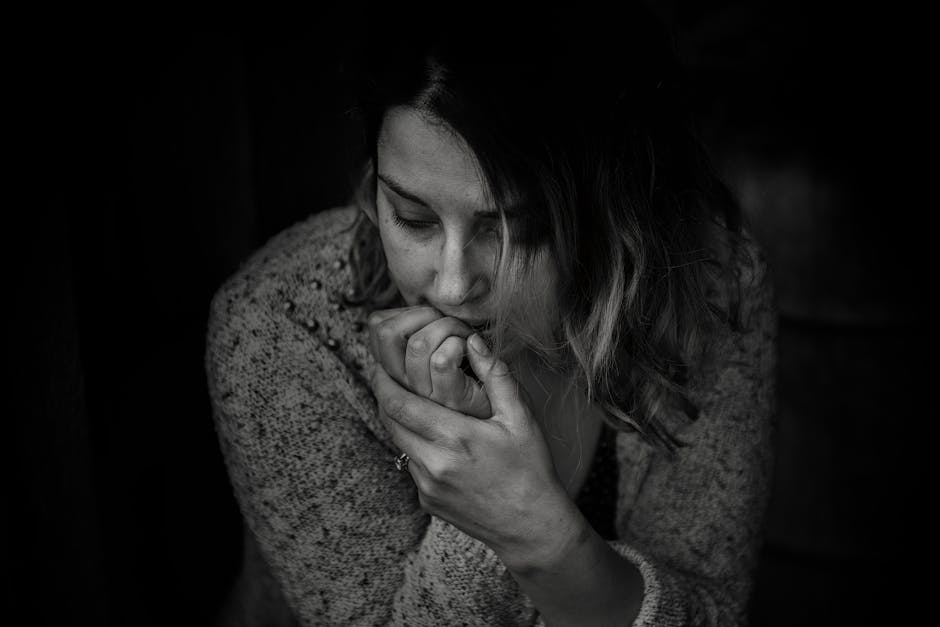 By practicing this suggestion over time you
will get better at it. Often anxiety sufferers can be helped by learning
how to be gracefully assertive in their relations with others. By learning polite assertiveness, you can
decrease your anxiety across several situations. We hope that you have enjoyed this video. To get more help with your anxiety, and obtain instant access to the 5 steps to
recovery from panic attacks and agoraphobia, just visit our website and provide your email
address. All of our information is free. Please visit our website at
By practicing this suggestion over time you
will get better at it. Often anxiety sufferers can be helped by learning
how to be gracefully assertive in their relations with others. By learning polite assertiveness, you can
decrease your anxiety across several situations. We hope that you have enjoyed this video. To get more help with your anxiety, and obtain instant access to the 5 steps to
recovery from panic attacks and agoraphobia, just visit our website and provide your email
address. All of our information is free. Please visit our website at 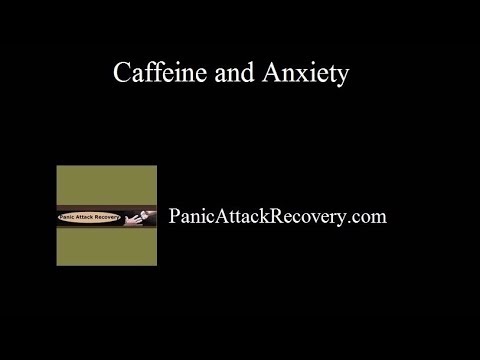
 Withdrawal symptoms have been reported, such as headache, irritability, sleeplessness, confusion, nausea, restlessness, tremor palpitations, and raised blood pressure. You might be asking how to kick the caffeine habit or reduce the amount of coffee you consume. We would suggest you may want to think about two things. 1 Become aware of all your sources of caffeine by taking an inventory of all of your caffeine levels and 2. Consider substituting green tea in place of all or some of your daily coffee. Why green tea? Although green tea, has some caffeine? It s not nearly as much as coffee As mentioned, while a brewed 8 oz cup of coffee can have about 95 200 mg of caffeine. Green tea has about 14 40 mg of caffeine. Only In addition to subscribing to our YouTube channel, you can visit our website and Sign up for our free email newsletter, Obtain a range of articles about panic, attacks, anxiety, and agoraphobia, and Follow us on Twitter and Facebook. By taking advantage of these options, you can be assured that you will not be missing out on any of our resources. Please visit our website at
Withdrawal symptoms have been reported, such as headache, irritability, sleeplessness, confusion, nausea, restlessness, tremor palpitations, and raised blood pressure. You might be asking how to kick the caffeine habit or reduce the amount of coffee you consume. We would suggest you may want to think about two things. 1 Become aware of all your sources of caffeine by taking an inventory of all of your caffeine levels and 2. Consider substituting green tea in place of all or some of your daily coffee. Why green tea? Although green tea, has some caffeine? It s not nearly as much as coffee As mentioned, while a brewed 8 oz cup of coffee can have about 95 200 mg of caffeine. Green tea has about 14 40 mg of caffeine. Only In addition to subscribing to our YouTube channel, you can visit our website and Sign up for our free email newsletter, Obtain a range of articles about panic, attacks, anxiety, and agoraphobia, and Follow us on Twitter and Facebook. By taking advantage of these options, you can be assured that you will not be missing out on any of our resources. Please visit our website at